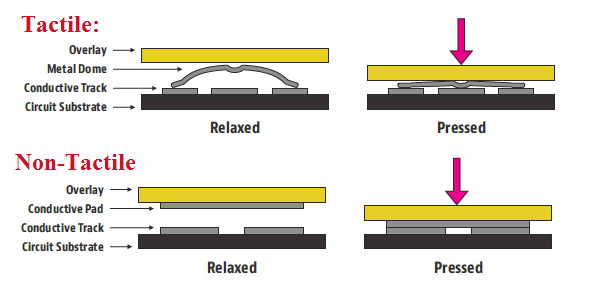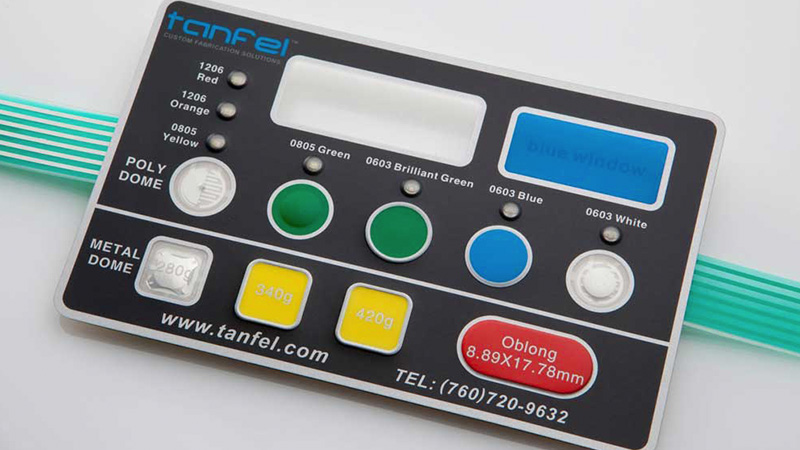Comprehending the Significance of Membrane Switches in Interface
Membrane switches are indispensable components in the style of reliable customer interfaces, facilitating not only performance yet also improving visual allure and user interaction. As we check out the future patterns and different benefits linked with Membrane technology, it becomes clear that these switches are much more than just elements; they represent a convergence of development and functionality.
What Are Membrane Switches?

The spacer layer, which includes adhesive residential or commercial properties, permits the separation of the circuit layer from the overlay, making certain that the button remains in a non-activated state until pushed. When stress is related to the overlay, it compresses the spacer layer, connecting the gap and completing the circuit in the underlying layer. This layout not only lowers the physical room required for traditional mechanical buttons but additionally improves the resilience of the device, as Membrane switches are usually resistant to dirt, wetness, and other ecological elements.
Commonly located in applications ranging from customer electronics to clinical gadgets, Membrane switches are integral to contemporary technology, giving a straightforward and effective interface that lines up with contemporary style needs.
Benefits of Membrane Switches
While numerous button innovations exist, Membrane Switches offer distinctive advantages that make them specifically desirable in different applications. Among the primary advantages of Membrane switches is their small layout, which enables space-saving executions in devices where realty is restricted. Their thin profile not just boosts aesthetic charm yet also assists in light-weight construction.
One more substantial advantage is their resistance to environmental aspects. Membrane buttons are generally secured versus dampness, dust, and pollutants, making them suitable for usage in demanding atmospheres, such as clinical tools and commercial tools. This resilience prolongs the life expectancy of the button, lowering maintenance costs and enhancing dependability.
Additionally, Membrane buttons can be tailored to fulfill specific design requirements, integrating distinct graphics and colors that improve individual communication. Their responsive comments choices can likewise be customized to supply an enjoyable customer experience. In addition, Membrane buttons are economical, specifically in high-volume applications, as they can be created effectively.
Applications in Different Industries

In the consumer electronic devices market, Membrane buttons are common in devices such as microwaves, cleaning devices, and remote controls. Their responsive comments and visual choices enhance customer experience while offering a streamlined, contemporary look. Furthermore, automotive suppliers use Membrane switches in control panel controls and infomercial systems, where room is restricted, and individual engagement is essential.
Additionally, the commercial industry leverages Membrane switches in control panels for equipment and equipment, permitting instinctive operation in usually severe settings. Their resistance to chemicals and moisture makes sure longevity and dependability in these applications. On the whole, the adaptability of Membrane Switches adds considerably to their prevalent use, making them important in numerous technological domains.
Style Factors To Consider for Membrane Switches

When making Membrane switches, several essential factors to consider need to be considered to ensure ideal performance and individual experience. To start with, the selection of products is critical; selecting resilient, top notch substratums can boost the button's long life and resistance to ecological variables such as dampness and temperature level variations.
Secondly, the design of the visuals overlay should focus on clearness and ease of use. Icons and text should be legible, and the layout should assist in instinctive interaction (membrane switches). In addition, responsive comments is necessary; integrating a tactile dome or various other devices can improve the user experience by Check Out Your URL providing physical verification of activation
One more essential factor is the button's electrical efficiency. Developers should ensure that the conductive traces are effectively created to reduce resistance and stay clear of signal disturbance. This involves analyzing the needed actuation force and making certain compatibility with the electronic parts they will user interface with.
Future Fads in Membrane Modern Technology
As technology remains to advancement, Membrane switches are positioned to evolve substantially, driven by innovations in products and manufacturing methods. One arising trend is the unification of advanced products, such as conductive inks and flexible substrates, which improve durability and minimize the total weight of Membrane switches. These products not just improve the tactile feedback but likewise enable the layout of switches that can stand up to harsher ecological conditions.
Additionally, the assimilation of touch-sensitive modern technologies is transforming conventional Membrane Switches right into more interactive interface. Capacitive touch sensing units installed within Membrane switch panels can provide a much more instinctive and responsive individual experience, lining up with the expanding need for streamlined, modern designs in consumer electronics.
Furthermore, improvements in printing methods, such as electronic and 3D printing, make it possible for quick prototyping and modification of Membrane switches. This versatility enables makers to react faster to market needs and additional hints customer choices.
Finally, sustainability is ending up being a considerable focus, with producers checking out environment-friendly products and processes. As these trends unfold, the future of Membrane modern technology assures improved performance, aesthetic appeal, and environmental duty, strengthening their function in sophisticated user interfaces across numerous markets.
Final Thought
Finally, Membrane Switches represent an important component in the layout of individual interfaces, integrating functionality with visual versatility. Their advantages, including longevity and resistance to ecological elements, make them suitable for varied applications across various sectors. Thoughtful style considerations boost user communication and experience. As improvements in technology proceed, the evolution of Membrane switches is anticipated to additional improve interface, driving innovation and boosting usability in a significantly complicated technical landscape.
Membrane switches are integral parts in the design of efficient user interfaces, assisting in not just performance yet also improving visual charm and customer communication.Membrane Switches serve as a vital part in various individual interfaces, promoting a seamless interaction between individuals and digital tools.While numerous switch innovations exist, Membrane Switches deal distinctive benefits that make them particularly desirable in various applications.Furthermore, Membrane switches can be personalized to satisfy details layout requirements, incorporating distinct graphics and colors that improve individual communication.In verdict, Membrane Switches stand for an essential part in the layout of customer interfaces, incorporating capability with visual adaptability.